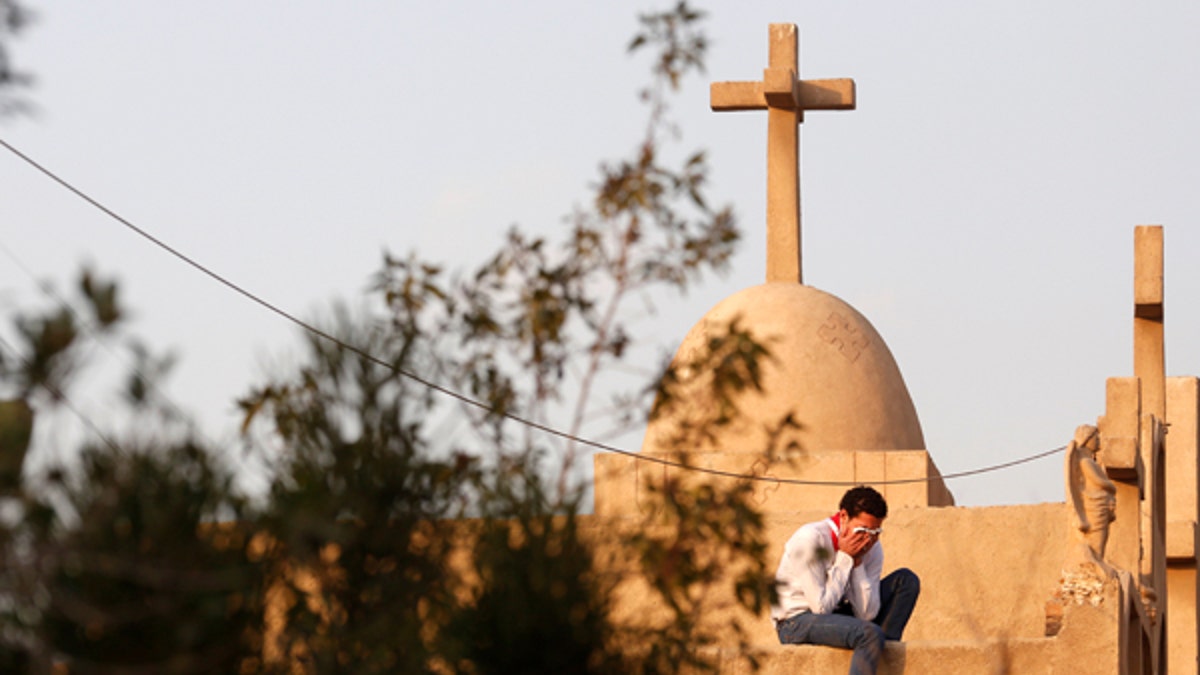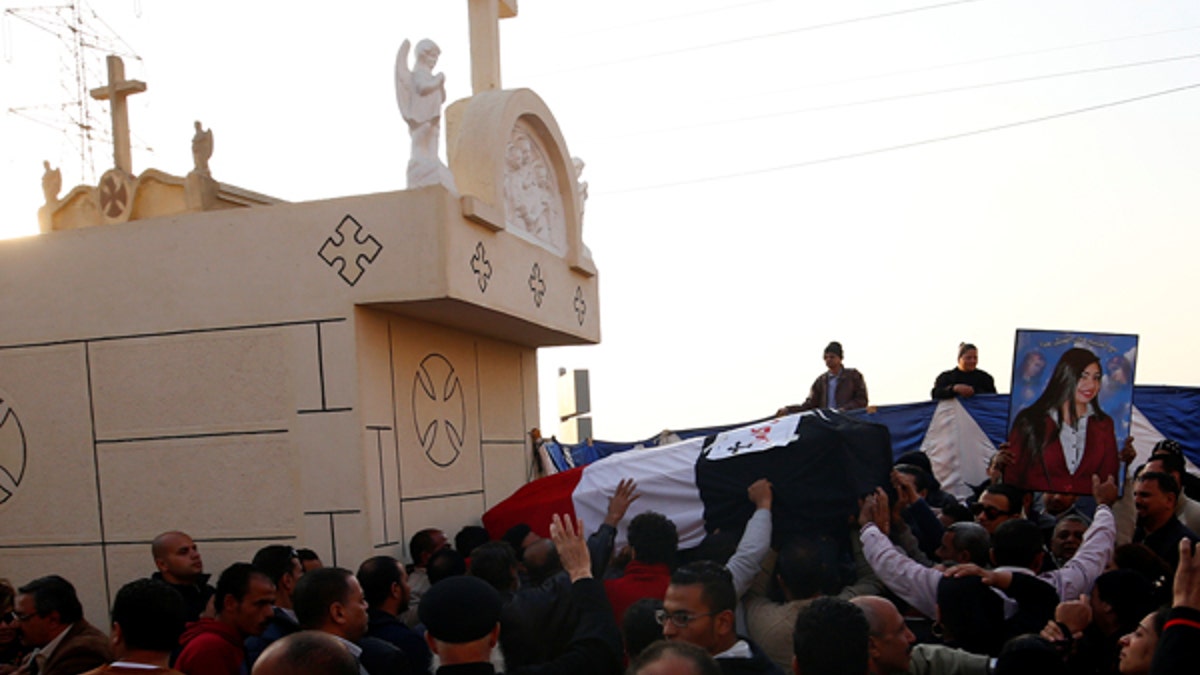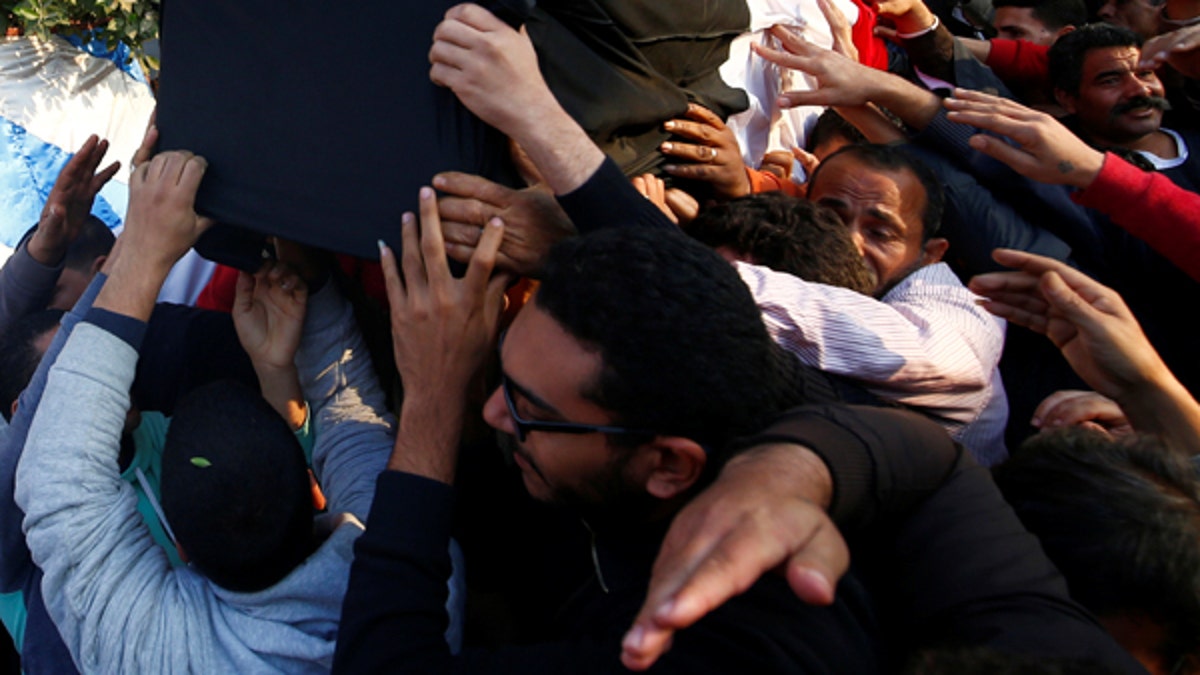
December 12, 2016: A man cries during the funeral of victims killed in the bombing of Cairo's Coptic cathedral, at the Mokattam Cemetery in Cairo, Egypt. (Reuters)
It was Christmas Eve last year when Egyptian President Abdel Fattah el-Sisi extended his support to the Coptic Christian community, attending Mass at St. Mark’s Orthodox Coptic Church—a symbolic act that showed the former Army general’s resolve to bring together the nation’s 10 million Christians and the Muslim majority of 70 million.
But in the year since that olive branch was offered, extremists on the fringe of the Muslim majority have carried out a number of attacks on the Coptic community, including Sunday’s bombing of St. Mark’s – the largest such attack since the overthrow of Mohamed Morsi, the Muslim Brotherhood president that el-Sisi ousted on July 3, 2013.

The body of one of the victims from Sunday’s bombing of Cairo’s main Coptic Cathedral is carried to be buried at the Mokattam Cemetery. (Reuters)
That coup was supported by the Coptic pope, Tawadros II, and now, Christian advocates tell FoxNews.com, it appears that members of the Brotherhood and other Muslim extremists are targeting Copts during the Christmas season, when they attend church in larger numbers and are more vulnerable.
Copts make up about 9 percent of Egypt's population, and the Morsi regime caused a rift in state unity based on worship that brought with it a rise in sectarian violence against Copts.
According to a recent report from the Vatican agency, Aid to the Church in Need, while the situation for Copts has improved somewhat under el-Sisi, they have faced many incidents of discrimination and persecution.
"A few years ago there was a massive attack that destroyed hundreds of Coptic churches and homes. But the attack this past weekend has been one of the more deadly attacks in recent times," David Curry, executive director of Open Doors USA, a California-based non-profit that helps persecuted Christians around the world, told FoxNews.com. "It's difficult to know the motivation of the attackers, but we often see an increase in attacks in this region around the Christmas season. It is when Christians are most vulnerable. The number of Christians visiting churches spikes as they flock to honor this holy day."

Relatives of a Christian woman who was killed in the bombing of Cairo's main Coptic cathedral, carry her body to bury at the Mokattam Cemetery in Cairo, Egypt. (Reuters)
When asked if it's possible that the attackers chose St. Mark's because of el-Sisi's visit last year, Curry said it was very possible.
"It is a well-known church, and, for extremists trying to draw attention and fear, it is a prime spot," he said.
In a statement circulated online on Tuesday, The Islamic State [ISIS] claimed responsibility for the suicide bombing that killed 25 people. They also alleged that the bomber had actually killed and injured 80 people, while vowing "to continue war against apostates."
Funerals for the victims of the attack were held on Monday in Cairo, at which Pope Tawadros II said the bombing “is not a tragedy for the church alone but for everyone, for Egypt.”
El-Sisi also attended, and he was quoted by local media condemning the Muslim Brotherhood for attempting to destroy the country and divide its people. It’s consistent with the president’s efforts to reach out to the Coptic community, including the repeal this past September of an Ottoman-era law that banned the construction of new Christian churches.
Even so, extremists have lashed out at Copts repeatedly.
In May, a church in Minya, some 170 miles south of Cairo, was burned to ground after an attack by what local clergy describes as “extremists.” Local media reported that the cause of the fire was a short circuit in the church’s wiring, which was a deliberate falsehood, church officials say.
In the southern part of the country, there are frequent attempts to extort money from Copts by Muslim clans, people in the community report, with more than 20 known cases that were reported to police and in which nothing was ever done to rectify the matter.
We often see an increase in attacks in this region around the Christmas season. It is when Christians are most vulnerable. The number of Christians visiting churches spikes as they flock to honor this holy day.
In one incident in al-Qusiya, a village about 50 miles south of Minya, members of various Coptic families were forced to barricade themselves in one house when extortionists from a local Muslim clan attacked them for not paying “taxes.”
“It’s a symptom of an underlying problem in Egypt,” Edward Clancy, director of outreach for Aid to the Church in Need, told FoxNews.com. “The Muslim Brotherhood hijacked the constitution when they were in power to now, where we have President el-Sisi moving towards including the Coptic community. Is the government making strides, or is it just window-dressing?”
What it comes down to, Clancy said, is, “Will the Christian community be able to worship openly?”




















